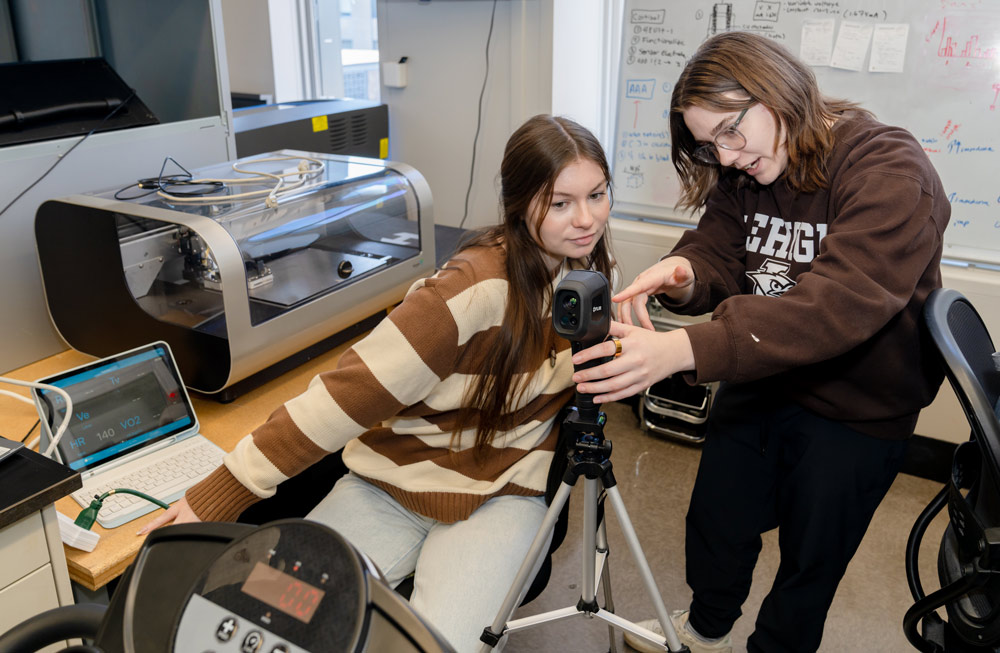
Experiential learning is fundamental to Lehigh Engineering’s mission—and a new addition to the Rossin College’s catalog of hands-on opportunities puts a fresh twist on undergraduate research.
The Rossin Research Scholars Program, launched in late 2024, pairs undergraduates with PhD students for a year-long mentored research project, culminating in the expected publication of a journal and/or conference paper. It’s a win-win: Authorship is a meaningful differentiator for undergrads as they consider their next steps, while the opportunity to design and lead research projects provides doctoral students with a valuable chance to test-drive a possible career path.
“Mentoring is teaching,” says Mark Snyder, a professor of chemical and biomolecular engineering and the college’s associate dean for graduate education. “You learn things best when you’re teaching them. Being able to lead students to a point where they feel comfortable tackling really challenging problems is a valuable experience.”
Interested undergrads submit a brief application (prior research experience is not required) to Snyder and Derick Brown, a professor of civil and environmental engineering the college’s associate dean for undergraduate education, who together oversee the program. PhD students write a short proposal identifying a project related to their own research where they’d like to serve as mentors, and review undergraduate applications of undergrads to select their preferred mentees.
 The Spring 2025 cohort is the program’s first. Undergrads began the semester navigating the research learning curve in the lab. Over the summer, they’ll engage in full-time research and receive a stipend. They’ll spend the fall semester writing up their work, contributing to a publication or an abstract, or attending a conference. Graduate students participate in a workshop on mentoring and also receive funding they can direct toward their research.
The Spring 2025 cohort is the program’s first. Undergrads began the semester navigating the research learning curve in the lab. Over the summer, they’ll engage in full-time research and receive a stipend. They’ll spend the fall semester writing up their work, contributing to a publication or an abstract, or attending a conference. Graduate students participate in a workshop on mentoring and also receive funding they can direct toward their research.
“What’s been so exciting to see is that this first group includes students with prior exposure to research and others who are eager but new to it,” says Snyder. “We want both types of students in this program.”
For the inaugural cohort, Snyder and Brown received nearly 50 undergraduate applications along with proposals from 18 PhD students, representing 15 faculty members.
One of those doctoral students is bioengineer Hayley Whitney ’24, a member of the lab led by Dhruv Seshadri, an assistant professor of bioengineering. Whitney, who is in her first year of graduate studies, is exploring how integrating subjective health information with wearable devices can improve performance in athletes, specifically, in members of Lehigh’s basketball, soccer, and football teams. The long-term vision, she says, is to develop AI-driven injury prevention and return-to-play strategies while providing insights for coaches.
It’s a lot of work: She and her team monitor nearly 100 athletes, collect and analyze massive amounts of data, troubleshoot devices, and rise before dawn in the summer to observe practices. As soon as she heard about the new program, Whitney knew that an aspiring researcher could learn a great deal from her project and potentially take it in new directions. She saw just as much opportunity for her own growth.
“I’ve tutored my whole life, and I love, love, love, mentoring and teaching,” says Whitney. “But doing those things in a lab setting is a new experience for me. I’m looking forward to learning how to provide students the right amount of guidance and space to figure out solutions on their own.”
Through the Rossin Research Scholars Program, she’s honing those skills while mentoring Kailey Miller ’29, a first-year mechanical engineering student in the college’s Bachelor’s to Master’s Accelerated Program. Miller came to Lehigh with research experience gained in high school working on an anti-tremor device for people with Parkinson’s disease.
“When I got the email describing the program, I saw that it would allow me to spend my summer on campus and immerse myself in research,” says Miller, who will be assisting in the design of innovative technologies to further validate athlete performance and identifying key biomarkers associated with allostatic load, the wear and tear on the body caused by cumulative stressors. “Being partnered with a PhD student was really important to me because that’s the track I want to go on as well. And Hayley is amazing—she introduced me to the whole lab, showed me how to work all the equipment, and answered all my questions. I’ve learned so much from her already.”
That kind of impact underscores the value of hands-on learning, says Rossin College Professor and Dean Stephen P. DeWeerth, who has made expanding experiential learning a cornerstone of his tenure—as well as a pillar of the new First-Year Rossin Experience (FYRE) that is currently in development.
“We believe it’s critically important that all students engage outside of their formal learning in ways that help them explore their passions, define their identities, and chart a path toward meaningful, fulfilling careers.”

